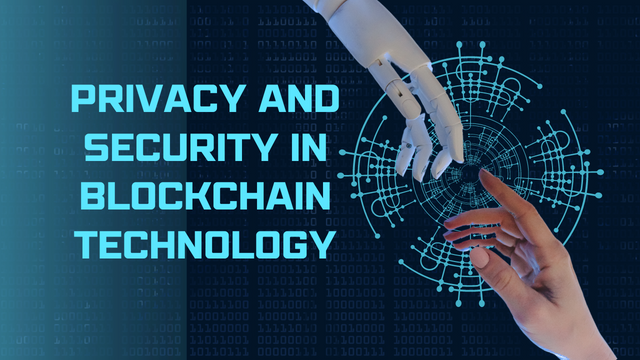Privacy and Security in Blockchain Technology
Blockchain technology has potential to revolutionize all the industries. It provides transparency and decentralization. As there are always two sides of picture. Similarly inspite of the benefits blockchain technology has some shortcomings as well. It has privacy and security issues. As the transactions performed on the blockchain cannot be changed so it is another issue regarding privacy and security. Today I will be discussing some precautions related to the security and privacy of the blockchain.

Privacy in Blockchain
Although transparent and traceable there is need to provide confidentiality for the transactions especially when dealing with sensitive information. Several methods that enhance privacy were invented. Crryptographic protocols like zero knowledge proofs and ring signatures are among them. These concepts and protocols enable people to use the system while at the same time keeping their identity anonymous through hiding transaction details.
Security in Blockchain
Security of a distributed ledger is to protect its integrity from unauthorized access. It also involves protecting from tampering or any other fraudulent activity. Different consensus mechanisms are used for the transparency and security in the blockchain. The users need to confirm and agree on the validity of new blocks. After the validation the blocks are added into the ledger. Furthermore cryptographic tools such as digital signatures and hash functions are employed in order to secure deals against being tampered with.
Challenges and Vulnerabilities
Although blockchain has strong security features blockchain technology also faces various challenges which could undermine its privacy or safety. For example an attacker may take control over 51% of all computing power within a network allowing them to alter trades and disrupt the system’s operations. Bugs within smart contracts, weaknesses found within decentralized applications as well as private key theft risk are among other vulnerabilities.
Regulatory Considerations

Privacy concerns associated with distributed ledger technology can be addressed through regulatory frameworks designed for this purpose. These regulatory frameworks should focus on consumer protection while taking into account rights related to data protection at different levels. The rules and regulations vary with respect to different locations.
Mitigating Risks and Enhancing Security
In order to make the distributed ledger system more secure, those involved should take into account different ways including technological, legal and educational. One way to do this is through the use of stronger security measures while another is conducting frequent audits and security tests. In addition, users need to be sensitized about securing their digital assets as well as private keys by giving them tips on how they can achieve this best. Lastly but not least, regulators should work together with developers towards coming up with appropriate regulations It will help ensure safety within such systems.
Future Outlook
The development of blockchain technology will always come along with challenges related to privacy as well as security. For example, new concepts like zero knowledge proofs may greatly improve confidentiality levels while homomorphic encryption could protect data from unauthorized access during computation process. There are also multi party computations which could allow several entities perform a certain task without sharing their input information among themselves thus enhancing confidentiality further in these applications. Moreover, researchers working hand in hand with industry stakeholders and policymakers might provide better solutions for protection of personal rights.
Conclusion
Privacy and security are key elements of blockchain technology. It is important to address these issues if we want to realize its full potential. Trust can be built among the users by ensuring privacy is maintained as well as protecting against cyber threats through robust techniques for enhancing privacy, security protocols and regulatory frameworks. These foster adoption of different applications in blockchain and it will drive innovation in the blockchain technology. If security and privacy is provided to people correctly by following the rules and regulations then more people will adopt blockchain technology.
X Permotion
https://twitter.com/shabbir_saghar/status/1785552247281139871?t=cy79QOfdtOu3o0RIl-LPtA&s=19
Upvoted! Thank you for supporting witness @jswit.
Note:- ✅
Regards,
@jueco